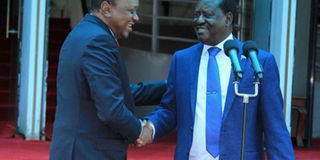Plenty of unanswered questions on the 'handshake' one year later

President Uhuru Kenyatta (left) and ODM leader Raila Odinga announce their political truce at Harambee House in Nairobi on March 9, 2018. PHOTO | FILE | NATION MEDIA GROUP
What you need to know:
- The government arrested and charged lawyer MP Tom Kajwang’ with swearing-in Mr Odinga and violently deported Mr Miguna to Canada.
- A key demand of Nasa post-election was national dialogue that would, among a myriad other issues of national importance, address the matter of electoral justice.
Saturday will mark the first anniversary of the extravagantly acclaimed peace deal between the legally elected and installed President Uhuru Kenyatta and the self-declared and self-sworn People's President Mr Raila Odinga.
In my view, the two former sworn and zealous enemies-turned overzealous bosom friends, on March 9, 2018, suddenly, but not surprisingly, publicly shook hands on a private and secret contract on Kenya between them.
I wish to use today’s column as a curtain raiser to the event and the next, a week today, to raise issues that should help Kenyans understand the meaning of the so-called handshake and its portent for Kenya's politics.
The two presidential elections of August and October 2017 were bitterly fought. Indeed, the opposition coalition, National Super Alliance (Nasa), was cobbled together for the singular purpose of capturing the presidency or executive power.
POLL STAND-OFF
A disorganised and self-cannibalising Nasa was comprehensively beaten in the county, senatorial, gubernatorial and National Assembly polls. \
It also lost the presidential vote but successfully challenged the result in court. Incredibly, it sat out the court-ordered rerun.
That set the stage for a tense, foul-tempered and peace-threatening post-election stand-off in which Nasa portrayed the incoming administration of the triumphant Jubilee Party as murderous, vote-stealing and illegitimate.
Nasa demanded a new presidential election and an interim cross-party government.
It got neither and soon escalated the impasse when it declared that just as progressive forces won the struggle for political pluralism in the 1990s, it would win the fight for free and fair elections post the 2017 General Election.
DEPORTED
Nasa launched RESIST, a national resistance movement, anchored in mass action as it threatened secession.
It forced matters to a head when on January 30, 2018 it 'swore in' Mr Odinga as the People's President, which investiture then Attorney General Githu Muigai decreed was treasonous and which act carried a death sentence. And from here the questions begin.
One, Mr Odinga's investiture was illegal but the government did not keep the nuclear option of arresting the man firmly on the table fearing violent demonstrations by his legion supporters across the land.
This may have been the outcome radical elements such as exiled lawyer Miguna Miguna and perhaps Mr Odinga himself wanted but were frustrated.
The government arrested and charged lawyer MP Tom Kajwang’ with swearing-in Mr Odinga and violently deported Mr Miguna to Canada for masterminding the investiture.
The government suddenly discovered that Mr Miguna, who would have been Governor of Nairobi and who was previously a senior adviser to Prime Minister Odinga, was not Kenyan but Canadian. Mr Odinga, aka Baba, was unscathed.
SECESSION
Two, Mr Odinga has repeatedly claimed that Nasa was bent on establishing its administration in those counties in which it beat Jubilee in the 2017 General Election and go ahead and collect taxes.
The name for that is Balkanisation of the country and it is illegal. The other name for it is secession and it is illegal.
But Mr Odinga and/or Nasa escaped arraignment. The reason is plain and simple: The government did not want a confrontation which Nasa appeared to be courting.
Three, a key demand of Nasa post-election was national dialogue that would, among a myriad other issues of national importance, address the matter of electoral justice.
Nasa claimed, time without number, that it sat out the court-ordered presidential rerun vote because the Independent Electoral and Boundaries Commission, the polls umpire, was unchanged and so the fix was in.
Four, Mr Odinga was sworn in on January 30. Towards the end of February, Mr Odinga addressed a top organ of his Orange Democratic Movement (ODM) at which he called the government a malevolent dictatorship.
BETRAYAL
A week later came the public seal of a private deal. The handshake was the tip of the iceberg; the action had been going on, as Kenyans like to say, chini ya maji.
For how long? The handshake cannot possibly have been a result of a nine-day wonder!
Five, Mr Odinga liked to paint the picture of Kenya on the brink as a result of his threat of parallel administration in Nasa strongholds and a government determined to have its way.
The uncertainty of post 2017 extended election cycle comes nowhere near close to the apocalyptic madness and mayhem of 2007, so what could have forced the government's or the President's hand in negotiating with Mr Odinga?
Six, did Mr Odinga betray his Nasa colleagues? And, was Arthur Miller right that betrayal is the only truth that sticks? Watch this space.





